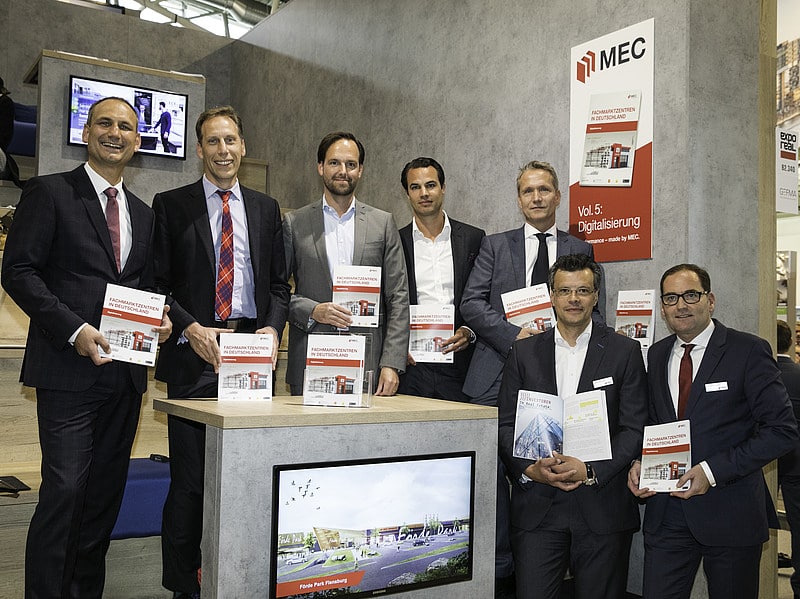Digitalisation requires new approaches to thinking about construction and planning regulations
Online trading forces the stationary retail trade to react. But the current application of construction and planning regulations prevents this. “Demand in rural and small-town areas is dropping, which is due to the residential and mobility developments that are associated with the digital upheaval in trade and demographic shifts,” says the managing shareholder of Dr. Lademann und Partner, Uwe Seidel. He adds, “In response, and in order to ensure its survival, the only available option for the retail trade in such areas is the expansion of its selling space. How strong this economic pressure is, and what lasting effects can be achieved in this way for local supply networks, currently remains unclear, and urgently requires expert analysis. This has not yet taken place.”
The COO of MEC, Christian Schröder, adds, “The reaction of retailers therefore must not be viewed as a disruption of the zoning balance. Rather, it serves to secure the provision of rural areas with sales space. Dialogue is urgently required here between trade, public administration and real estate operators.”
Digitalisation as a challenge and an opportunity
For this reason, and in the context of increasing competition in retail trade, and indirectly in retail real estate, the 5th Retail Parks Report is dedicated to providing a cursory look at the subject of digitalisation. The key questions are, “What does digitalisation mean for the world of retail real estate, and for the industries associated with it? Is digitalisation the unstoppable, revolutionary and destructive saviour or nemesis it gets presented as? What real estate-related technologies are under development, and how big is the ‘prop-tech’ sector? How can we approach a subject that is often intangible, and how can we derive a framework for action?”
Digitalisation increases the requirements of investors for retail real estate
Revenues from retail real estate fell significantly in 2016 compared to the previous year, to just €13.6 billion. The digitalisation of trading and retailing represents a fundamental challenge to the business model of all users of retail real estate. “As a reaction to this increase in the risk of investments in retail real estate, investors are becoming more selective. The requirements for properties are increasing,” says the Head of Retail Investment for Germany at Savills, Jörg Krechky.
The analysis of tenant concepts, and how these in turn function in the digital world, is becoming increasingly important for investors, including in particular the fashion sector. “In our centers of the Retail Center Fund, we are attempting to avoid placing undue emphasis on fashionable concepts and brands, and to install above all everyday goods as the anchor of a stable investment,” explains the Portfolio Manager of the Retail Center Fund at Corpus Sireo, Thorsten Beckmann.
Mega-trends as the basis for real estate investments
But digitalisation is not the only trend real estate investors should be reacting to: progressive urbanisation, the global rise of the middle classes, the outsourcing of global growth centers out of the Western hemisphere, demographic change, and the increasing digitalisation and global networking are further topics. “These are the developments that will exert a decisive influence over the real estate industry in the coming decades. Future-proof investment products for real estate therefore need to find themselves on the winning side of these trends,” says the Head of European Research at TH Real Estate, Stefan Wundrak.
Customer orientation – comprehensive and credible
Das Leben der Kunden bequemer und einfacher zu machen, ist ein wesentlicher Nutzen, der vom Einzelhandel heute erwartet wird. Produktwelten zu schaffen, Sortimente zu verknüpfen und Lösungen für den Alltagsgebrauch zu kreieren, macht heute eine „gute Auswahl“ aus. „Erfolgreiche Ladenkonzepte sind aus der Perspektive des Kunden gedacht, geplant und umgesetzt. Sie bieten ein optimales Verhältnis zwischen Nutzen und Zeitaufwand“, sagt der Head of Retail & Real Estate Consulting bei GfK, Sebastian Müller.
Guest articles from industry experts and prop-techs
Alongside established retailers such as MediaMarktSaturn, who present their technologies of tomorrow to the customers of today, the 5th Retail Parks Report will also provide a platform for representatives of the new start-up scene in the real estate industry. Digital solutions for retailers will be introduced by GK Software and Phizzard, an option for more efficient cooperation with retail park service providers will be presented by Eyeled, and the use of BIM in new and existing buildings will be explained by Atelier Winkler. An overview of the new entrepreneur scene, and of the difficulties and challenges the young companies face, will be presented by the Chairman of the German PropTech Initiative, Alexander Ubach-Utermöhl.
The new Retail Parks Report can be found online at www.mec-cm.com. .
Pictured left to right: U. Seidel (Dr. Lademann und Partner), S. Wundrak (TH Real Estate), S. Müller (GfK), T. Beckmann (Corpus Sireo), J. Krechky (Savills), M. Lück (MEC), C. Schröder (MEC).


